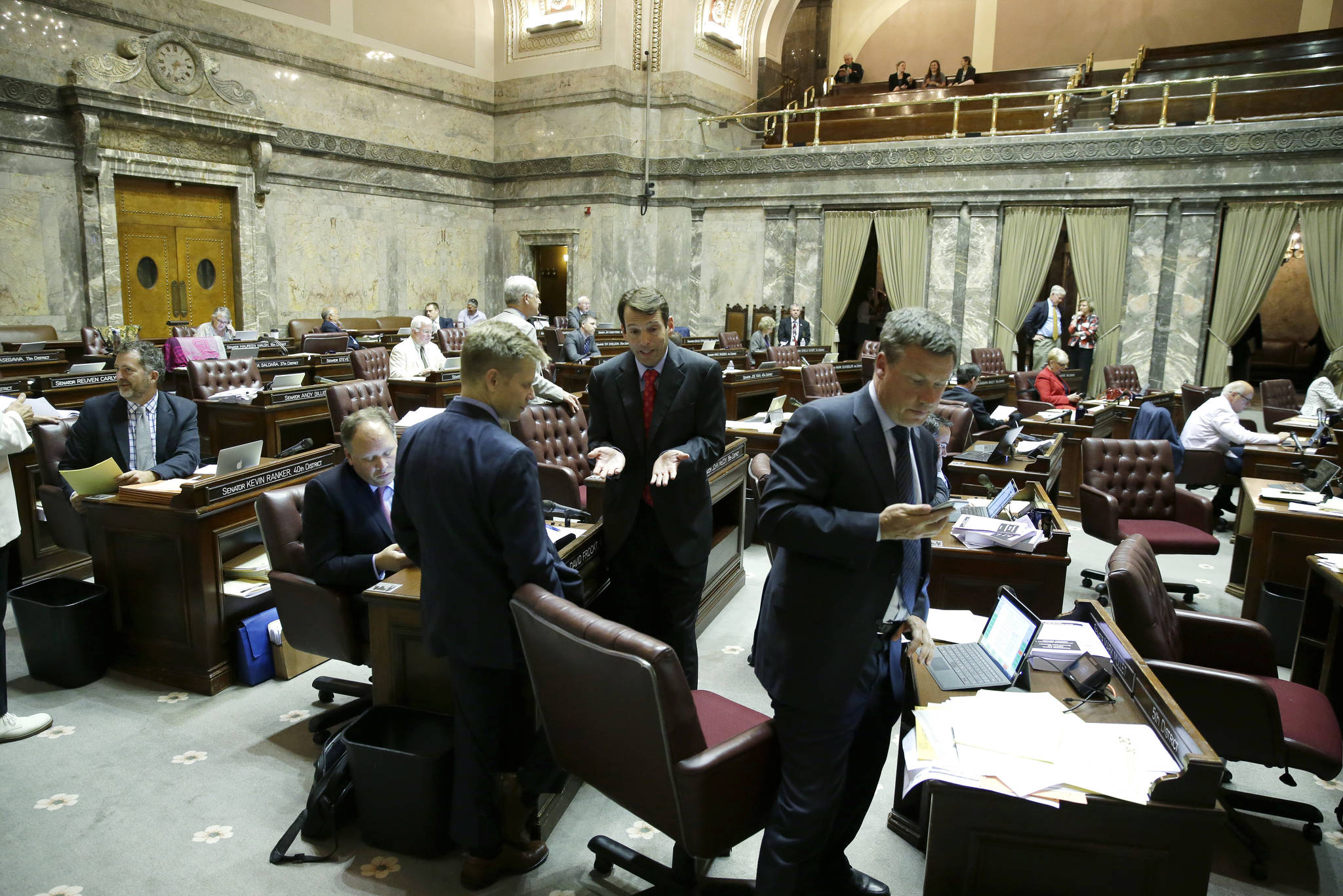By Rachel La Corte
The Associated Press
OLYMPIA — With less than an hour to spare, Gov. Jay Inslee signed a new two-year, $43.7 billion state operating budget in time to avoid a partial government shutdown.
His signature came after rapid voting Friday in the Legislature the same day details of the budget were publicly released. The Senate approved the measure on a 39-10 vote, followed by the House’s 70-23 vote.
The budget spends $1.8 billion on K-12 public schools over the next two years. That investment is part of a $7.3 billion hike over four years designed to satisfy a state Supreme Court ruling that the state had not adequately funded basic education.
The budget also adds $618 million for public employee collective bargaining and pay and $102 million in mental health spending.
Inslee signed the bill surrounded by a large bipartisan group of lawmakers from the House and Senate.
“I believe this budget at long last will meet our constitutional obligations to fully and fairly fund basic education,” he said.
The plan is paid for with a mix of revenue. The statewide property tax per $1,000 of assessed value increases from $1.89 to $2.70, with the increase being earmarked for education. That rate — expected to bring in $6.6 billion over the next four years — has $1.6 billion of that coming in the next two years.
The plan also keeps in place local property tax levies but caps them beginning in 2019 at a lower level and requires they be used for programs that supplement basic education.
Senate and House nonpartisan analyses show different impacts of the property tax increase after the offset of the lowering of local levies, with the Senate analysis showing most districts would see a decrease by 2021 and a House analysis showing that most would see an increase.
“Constitutionally, the property tax is what funds our public education system,” said Republican Sen. John Braun, one of the key budget negotiators. “We worked very hard to make sure it’s balanced so that there’s not a huge weight on one part of the state.”
House Democratic budget negotiators said that while the increase in some districts, including Seattle, is causing some of their caucus angst, it was the best solution they could agree to.
“We all know that in the end we have to pay for schools somehow,” said Democratic Rep. June Robinson. “This is what we can agree on in a divided government.”
Legislative leaders say the budget complies with a 2012 state Supreme Court ruling that they must meet the state’s constitutional requirement to fully fund the state’s basic education system.
Lawmakers have already put more than $2 billion toward the issue since the ruling, but the biggest piece remaining of the court order is figuring out how much the state must provide for teacher salaries.
School districts currently pay a big chunk of those salaries with local property-tax levies.
The court has said the state has until Sept. 1, 2018, to do that but that the details — including funding — must be in place before the Legislature adjourns this year.
Lawmakers — who started their regular 105-day legislative session in January — have had to go into three overtime sessions to reach agreement.
Republican Rep. David Taylor said during debate in the House that while he loved the policy, he had to vote no on the education funding plan because of the property tax impacts on his school districts.
However, he called the plan a “clear message to the court that we’ve been serious the whole time.”
An additional $456 million over the next two years comes from adding sales tax to bottled water, removing the tax break for fuel extraction used by oil refineries and requiring online retailers based out of state to collect and remit sales tax from Washington state customers.
The overall plan also would lower the business and occupation rate on state manufacturers from 0.484 percent to 0.2904 percent — the same preferential rate given to Boeing and others in the aerospace sector.
The outline of the education plan provided Thursday sets a minimum starting salary for teachers at $40,000, with adjustment for inflation and regional differences.
Under the plan, the average minimum salary for instructional staff will be $64,000, and adding in regionalization, it will range from $66,194 to $82,081.
School districts can pay a salary over the maximum of $90,000 by up to 10 percent for educational staff associates or teachers who teach science, technology, engineering, math or in bilingual or special education programs.
Even though the operating budget is done, lawmakers still need to address the capital budget that deals with projects across the state. That budget has been held up by a dispute over a legislative fix to a water ruling. Legislative leaders acknowledged they may need additional time this month to finish work on that.

